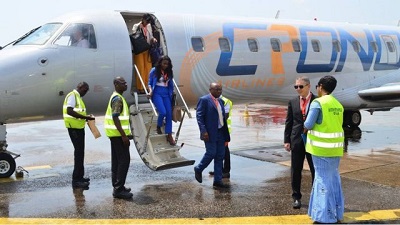
Since the beginning of the year, the entire world has been devastated by the emergence of the Coronavirus, which emanated from China during the last stages of last year.
Almost all aspect of human life has been severely affected. Employment and labour, education, health, agriculture, business and finance have seen a downward trend. By way of social life, many dead bodies are still being kept in the morgue, some of which have been there for more than one year. Weddings and other social, as well as religious activities have been shelved. Travel bans and restrictions on seminars and workshops have slowed down business activities.
Many homes are in deep sorrow and fear, while uncertainty and anxiety have crippled many individuals and governments in the world. With the global economy virtually grinding to a pause, poverty continues to chase households as many were faced with lockdown protocols. The situation is worsened by people’s inability to make income and have to depend on governments, friends and relations or go hungry.
Health situations have been terrible. The world’s well-positioned and well-to-do individuals have been severely affected. Royals, politicians, medical doctors, celebrities, the billionaires, the clergy and scientists have all had their share of the uncomforting situation. The disease knows no boundaries, colour, race nor social and economic status. Not even age and financial status.
Politicians around the globe such as the British Prime Minister, Boris Johnson, the President of Brazil, Jair Bolsonaro, the Presidential Chief of Staff in Nigeria, Abba Kyari and the European Union’s Chief Brexit negotiator Michel Barnier as well as the National Security Advisor in Brazil Augusto Heleno have all been affected with the novel virus.
Highly profiled royals have not been spared either. The Prince of Wales, and the heir to the British throne Prince Charles and the Prince of Monaco, Prince Albert, have been Coronavirus patients. Others like the famous Hollywood couple Tom Hanks and Rita Wilson, the best-selling Chilean writer, Luis Sepulveda, the French actress Olga Kurylenko, the British actor and musician, Idris Elba and The British actor and musician Andy Cohen are just a few of high-ranking people infected with the Coronavirus. The celebrated international Football Manager, Josep “Pep” Guardiola lost his mother, Sala, to the disease.
Many high-profile events have been either canceled or postponed. For instance, the annual Met Gala, which is often referred to as Fashion’s biggest night out, has been postponed indefinitely while the Metropolitan Museum of Arts Show in the United States of America has also been called off.
The annual world’s biggest carnival in the city of London is the abeyance with the world’s Olympic games scheduled for this summer, for the first time in its history, has been rescheduled for next year.
The world’s most patronised sport, football, is perhaps the biggest disappointment to its followers and organisers. Thankfully, the game is gradually bouncing back in certain parts of the world.
In Ghana, land, air and seaports were closed for five months. For this reason, the Ghana Airport Company, for instance, has lost over 500 million dollars. Many other institutions have also experienced huge financial losses.
Last Sunday, the President, Nana Addo Dankwa Akufo-Addo, delivered his 16th address to the nation to update his fellow Ghanaians on the COVID-19 situation.
He announced further the easing of restrictions in some areas of national life. This included the reopening of the nation’s international airport, the Kotoka International Airport. The reopening comes with measures, including the installation of COVID-19 testing facilities to help the continuous control of the Coronavirus, which the President has expressed satisfaction. Another easing of the COVID-19 restriction announced by the President included the partial reopening of schools for second-year students of Senior and Junior High Schools.
These were done because of the government’s conviction that it was safe to do. President Akufo-Akufo was of the view that his actions would in no way jeopardise the lives and livelihood of his people and that it was rather safe for the people he leads.
“Two weeks ago, the total number of active cases, that is persons currently with the virus stood at one thousand, eight hundred and forty-seven (1,847) persons. As of Friday, 28th August, the number of active cases has reduced to one thousand and fifty-nine (1,059) persons. A total of forty-two thousand, nine hundred and sixty-three (42,963) persons have recovered, and two hundred and seventy-six (276) persons, a great majority of them with underlying illnesses, such as hypertension, diabetes, and chronic liver disease, have sadly died.”
This is very much appreciated, but the words are still echoing that “we are not in normal times.” Indeed, these are not normal times, but man must survive, and life must go on. COVID-19 cannot be such a hindrance to life. In view of this, care must be taken so as not to escalate the situation.
Many Ghanaians are just disregarding the safety and health protocols in relation to the pandemic. Research by the Ministry of Health shows very discouraging figures in terms of the use of face mask as a protective material against the Coronavirus in the country. Social distancing might be worse, as seen at funerals and political party engagements in particular.
Ironically, these are not done at the blind side of the authorities. They see these all the time and, in some cases, they are part of such events. How many people have been arrested and prosecuted for not wearing a facemask in public places? We must not lose sight of the fact that this has now become law in our statutory books.
How can we, as a nation, behave as if nothing is at stake. Coronavirus, we know is real, and importantly it is not over until it’s over.
We cannot be negligent when COVID-19 is still around. Around the globe, over 25 and half million people have been infected with the disease, with nearly 100 thousand people confirmed dead. Africa has so far recorded about 22 thousand deaths out of more than a million confirmed cases. Ghana’s figures are that there are currently 1,063 active cases and 44,460 cumulative cases, while 276 have lost their lives.
The urgent need for a holistic mindset developed out of a positive behavioural change is crucial. Behavioural change communication, therefore, is the most vital for the initiation and sustaining as well as the enactment of these protocols as an integral part of social and public behaviour. This is known to have been used to promote health and other behaviour systems against disease around the globe.
Effective Behaviour Change Communication strategy is always crucial in ensuring all behavioural aspects of disease prevention and control. Under this, the provision of accurate, precise, relevant, and timely information to the public on how to contain the emergency and protect themselves against the virus is discussed, agreed and implemented.
According to President Akufo-Addo, “Since 31st May, when Government decided to embark on a strategic, controlled, progressive, and safe easing of restrictions in the country, to get our lives and economy back to normal in safety, we have continued to witness low hospitalisation and low death rates.” The belief is that we might have passed this stage long ago if people’s perception and behavior had changed positively towards the control and management of the disease.
In the words of the President, “Let me remind those amongst us, who want to continue to disregard these protocols, that severe sanctions exist in our laws for such persons, who will want to endanger the rest of the population through their actions and negligence. The law enforcement agencies will, where necessary, apply these measures without fear or favour, ill-will or malice, and without recourse to a person’s ethnicity, gender or religion.”
Nana Sifa Twum




